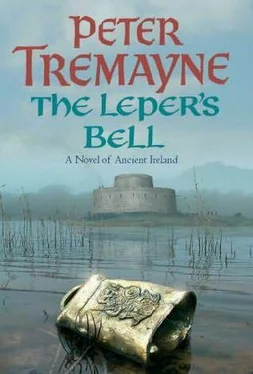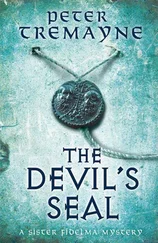Peter Tremayne - The Leper's bell
Здесь есть возможность читать онлайн «Peter Tremayne - The Leper's bell» весь текст электронной книги совершенно бесплатно (целиком полную версию без сокращений). В некоторых случаях можно слушать аудио, скачать через торрент в формате fb2 и присутствует краткое содержание. Жанр: Исторический детектив, на чешском языке. Описание произведения, (предисловие) а так же отзывы посетителей доступны на портале библиотеки ЛибКат.
- Название:The Leper's bell
- Автор:
- Жанр:
- Год:неизвестен
- ISBN:нет данных
- Рейтинг книги:4 / 5. Голосов: 1
-
Избранное:Добавить в избранное
- Отзывы:
-
Ваша оценка:
- 80
- 1
- 2
- 3
- 4
- 5
The Leper's bell: краткое содержание, описание и аннотация
Предлагаем к чтению аннотацию, описание, краткое содержание или предисловие (зависит от того, что написал сам автор книги «The Leper's bell»). Если вы не нашли необходимую информацию о книге — напишите в комментариях, мы постараемся отыскать её.
The Leper's bell — читать онлайн бесплатно полную книгу (весь текст) целиком
Ниже представлен текст книги, разбитый по страницам. Система сохранения места последней прочитанной страницы, позволяет с удобством читать онлайн бесплатно книгу «The Leper's bell», без необходимости каждый раз заново искать на чём Вы остановились. Поставьте закладку, и сможете в любой момент перейти на страницу, на которой закончили чтение.
Интервал:
Закладка:
It was clear that the rotund chieftain wanted to tell the story and Eadulf thought it better to assuage his pride than to make Fidelma’s task the more difficult by rudeness. Fiachrae was seated comfortably in his chair, a mug of mead in his hand, and smiling almost meditatively.
‘The lady Moncha gave birth to a son some months after her lord, Eóghan, ancestor of all the Eóghanacht, was slain in battle. The son was Fiachrae Muilleathan, and justly was he named “king of battles”.’
Eadulf smiled. ‘While I know that Fiachrae, which is your own name, means “king of battles”, as you say, I thought Muilleathan meant broad-crowned.’
The chieftain sniffed, not liking his tale to be interrupted.
‘An astrologer predicted that if the child were born on a certain day he would be chief jester of the five kingdoms of Éireann. If he was born on the following day, then the position of the stars would be more auspicious and he would become the most powerful king in the country. So when Moncha felt the birth pangs and the day of the better prediction had not yet come, she left the palace at Cnoc Rafoan and walked into the shallows of the nearby River Suir. She sat on a flat stone to delay the baby’s coming. So that day passed, and the baby came on the day when it was predicted that the child, if born then, would be a great king. But Moncha died from her efforts to delay the birth. When the infant emerged, the force of being pressed against the stone had flattened his forehead and hence he bore thereafter the sobriquet of Muilleathan or broad-crowned.’
The chieftain spoke in all seriousness and Eadulf controlled his features, which were about to give way to mirth, and merely nodded.
‘Go on.’
‘Fiachrae, or Fiacha, for he was also known by the diminutive form as a token of affection by his people, became a great king. He ruled here during the time when the great Cormac mac Art held the high kingship, which was about four centuries ago. The Uí Néill, of the sept of the Dál Riada, expelled Cormac for a time from Tara, but Fiachrae came forward and fought in his support, and Cormac regained the high kingship. For a time, all was well between the two kings, but Cormac was ill advised. An ambitious administrator told him that this kingdom of Muman, being the largest of the five kingdoms, should pay double the tribute to the High King of any other of the kingdoms. When this was demanded, Fiachrae refused.
‘Then Cormac did a very unwise thing, spurred on by the ambitions of his bad adviser. He came with an army into Muman. Fiachrae’s own army gathered here at this very spot, on this very hill which is shaped like a ship, and here it was that Cormac’s army surrounded Fiachrae’s men. Again Cormac was ill advised. His generals told him to burn out the army of Fiachrae and they set fire to the trees and bushes, but Fiachrae’s druid Mag Ruith caused a great wind to arise and the smoke was blown on to Cormac’s warriors, suffocating them and causing them to flee. Then Fiachrae gave the order for his warriors to pursue and punish Cormac’s army. Cormac had to pay reparation to Fiachrae.’
Eadulf smothered a yawn, doing his best to hide his boredom.
‘And everyone lived in happiness thereafter?’ he said.
The chieftain shook his head.
‘Life is not like a fairy story in this land, Saxon,’ he rebuked his guest, not picking up on Eadulf’s sarcasm. ‘Cormac had his revenge.’
Eadulf had glanced quickly round, wondering why Fidelma was so long in rejoining them. He realised that he should say something, and asked: ‘How?’
‘Cormac had a fosterling named Connla, son of Tadhg, lord of Éile, a rival to the Muman throne, and cousin of Fiachrae. Connla had contracted leprosy while at Tara…’
Eadulf stirred uneasily as he was reminded of the purpose in coming to Cnoc Loinge. ‘Leprosy?’
‘Indeed. And Cormac played a subtle game for his revenge. He persuaded Connla that a cure could be found if he bathed in the blood of a king who was kin to him. Connla went south and was welcomed at the court at Cnoc Rafoan and treated well by Fiachrae. Connla bided his time and one day he and Fiachrae went swimming in the Suir at Áth Aiseal, the ford of the ass. When the opportunity arose, he drove his sword into Fiachrae…’
‘And was cured of leprosy?’ Eadulf smiled.
The chieftain frowned at his flippancy.
‘Of course not,’ he snapped. ‘Connla was taken by Fiachrae’s guards but the dying king, showing his nobility, told them to spare his life and sent him to the house of the lepers in the land of the Corco Duibhne. The king died and was succeeded by his tanist Ailill Flann Bee from whose noble line descends our present king, Colgú … and, of course, your wife Fidelma.’
The chieftain suddenly smiled and cast a sideways glance at Eadulf.
‘But I hear that Fidelma is now mother to a son. How is the child? I believe his name is Alchú, is it not?’
Eadulf seized the opportunity to tell Fiachrae what had brought them to his small settlement. The chieftain’s garrulousness vanished.
‘But… but this is terrible. You should have told me immediately,’ he said. ‘This is catastrophic. A tragedy. Awful.’
Eadulf had the impression that Fiachrae’s words lacked sincerity. He felt a compulsion to point out that he had had little opportunity to tell the chieftain anything. It was only after he had told the story about the dwarf leper that he remembered Fidelma’s reticence about revealing the reason for their presence to Fiachrae earlier.
‘Well,’ Fiachrae said after a moment or two, putting down his mug, ‘there have been no reports of itinerants or lepers of any shape or size passing through here.’
‘Fidelma thought that he might have joined the dwarfs who are here…’
Fiachrae shook his head immediately. ‘These dwarfs are crossan. I hardly think that a leper, or a religious of any sort, would join them.’
‘Crossan?’
‘Crossan or drúth — gleemen or players. They are performing some play and the word has spread so that many people are coming to the fair from the surrounding countryside. I am told that they come from the Féis Tailltenn where they had great success in the entertainment of the High King.’
‘And none of them has been seen with a baby?’
Fiachrae was frowning. ‘You have reason to suspect these performers of the abduction of your child?’
‘There is reason to suppose that a dwarf was involved,’ Eadulf said shortly, for he was not entirely sure he agreed with Fidelma’s intuition on the matter.
‘Well, they do not have any babies with them. Nor have they come from Cashel. I am told that they came from Cluain Mic Nois and Tir dhá Ghlas, the territory of the two streams, directly north of Imleach.’
‘You seem well apprised of their movements.’
Fiachrae smiled thinly. ‘I have to be, my friend. I can take you to the top of the hill behind us and show you where the territory of the Uí Fidgente commences.’
‘So close?’ Eadulf had always associated the Uí Fidgente with a territory well to the west and slightly to the north.
‘Cnoc Áine, where we defeated the Uí Fidgente last year, is only five kilometres north of here. We are on the borderlands of the fractious clan that is always plotting against the rule of the Eóghanacht. That is why I have to take an interest in all the travellers passing through here. My people know this and have orders to tell me of any strangers passing into the country of the Uí Fidgente.’
Eadulf leaned forward with interest. ‘So you would know what travellers have come this way in the last few days?’
Fiachrae smiled complacently. ‘I do. I can tell you of a very strange person, for example, travelling with a religieux from the northern Uí Néill kingdom. He hardly knew our language, although he spoke several including the tongues of the Greek and the Roman.’
Читать дальшеИнтервал:
Закладка:
Похожие книги на «The Leper's bell»
Представляем Вашему вниманию похожие книги на «The Leper's bell» списком для выбора. Мы отобрали схожую по названию и смыслу литературу в надежде предоставить читателям больше вариантов отыскать новые, интересные, ещё непрочитанные произведения.
Обсуждение, отзывы о книге «The Leper's bell» и просто собственные мнения читателей. Оставьте ваши комментарии, напишите, что Вы думаете о произведении, его смысле или главных героях. Укажите что конкретно понравилось, а что нет, и почему Вы так считаете.











